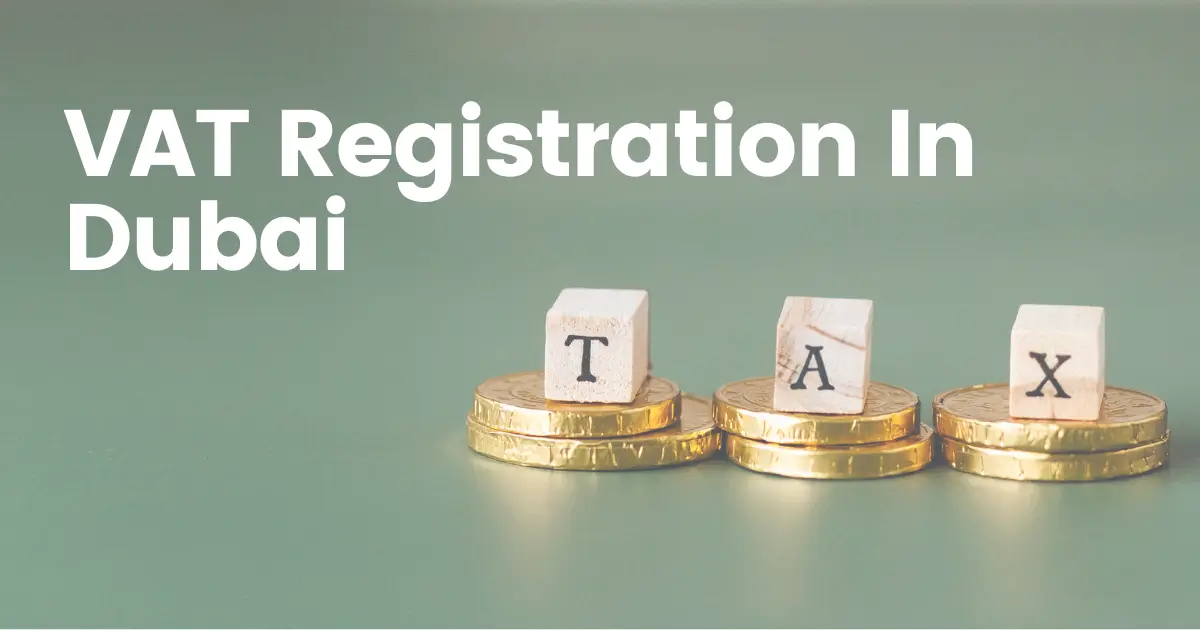As is widely known, one of the major business centers in the Middle East is Dubai. It’s because the city provides attractive tax benefits and business-friendly laws. Dubai also has excellent free zones, a strong community for business operations, and a great infrastructure. Moreover, Dubai’s standard of living is a big attraction, and the Dubai government’s focus on economic growth keeps creating opportunities for different types of businesses. But, we should follow some rules while setting up a business in UAE. Among that one of the main things you need to consider is VAT registration in Dubai. Knowing the details of VAT registration in the UAE is crucial.
In this blog, we’ll go into detail about VAT registration. It will give you a clear understanding of eligibility requirements, VAT registration types, and the importance of compliance.
Let us delve into this.
What is a VAT?
An indirect tax imposed on the sale of goods and services is called value-added tax, or VAT. The UAE government introduced it on January 1, 2018. It equally applies to imports. It’s critical for business owners to know about their VAT requirements.
Who should register under VAT?
Does every business need to register for VAT? No, only businesses that cross the specified yearly total sales limit must register for VAT.
Any company selling taxable goods and services in the UAE must register for VAT. Your business must apply for VAT registration if it meets the FTA’s eligibility requirements. No matter if it operates on the mainland or in a free zone.
Benefits Of VAT Registration In Dubai
- Legal Compliance
Registering for VAT guarantees that your company complies with UAE tax regulations. This is essential for avoiding penalties, fines, and legal issues.
2. Increased Credibility
Customers, partners, and suppliers generally consider businesses that are VAT-registered as more trustworthy and professional.
3. Avoiding Penalties
Fines and penalties may be charged for failing to register for VAT. It guarantees that you stay in compliance and avoid these financial setbacks.
Types of VAT Registration In UAE
Mandatory VAT Registration:
A Tax Registration Number (TRN) must be obtained by your business if your yearly turnover exceeds AED 375,000. Your permit to obey UAE VAT needs TRN.
Voluntary VAT Registration:
If your yearly turnover is more than AED 187, 500 and less than AED 375,000, you still have the choice to voluntarily register for VAT.
Documents For VAT Registration Dubai
In accordance with FTA instructions, companies must keep an accurate record of their documentation in order to fulfill their VAT obligations. The following is a list of documents that all businesses have to maintain up to date:
- A copy of the owner’s and partners’ passports
- Trade License Copies
- Emirates ID
- Memorandum of Association (MOA)
- IBAN and bank account information of the company
- Customs Authority Registration code
- A comprehensive account of the company’s revenue for the previous year, including bank statements, audit reports, and financial sheets.
VAT Penalties
Businesses must ensure that they complete the registration procedure by providing the necessary documents. Otherwise, they may face penalties. It’s a good idea to keep accurate records of your business from the very start to avoid challenges.
Moreover, businesses that are qualified for mandatory VAT registration must register within the time frame set by the FTA. Otherwise, you have to pay the fine.
Conclusion
Hopefully, now you have a clear idea about VAT registration in Dubai. But, handling Dubai’s VAT registration process can be difficult, particularly for people who are unfamiliar with the business world. This is where your company needs the guidance of expert VAT consultants Dubai.
Always remember that the goal of complying with VAT regulations is to improve the image of your business as well as to prevent fines.


